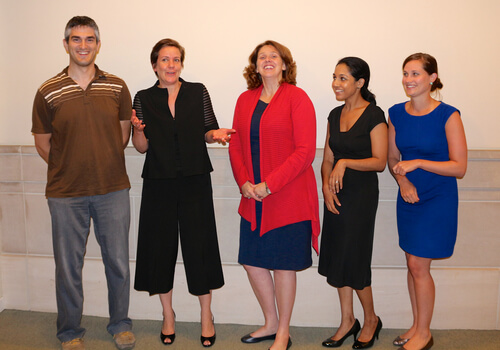
Meet Our New Board Members!
15 September 2014 Blog | Tags: board of directors
This fall we’re welcoming six new lawyers to our Board of Directors. Learn a little about them below: Allison Holt (@allisonmholt) is a litigation associate at Hogan Lovells, and she currently serves as the firm’s full time senior associate for the pro bono practice. Among other cases, Allison represents homeless families seeking access to appropriate emergency shelter during hypothermic conditions, and is currently working with the Mid-Atlantic Innocence Project on a criminal case in Virginia. Christina Jackson (@CJacksonPSJD) is Director of Public Interest Initiatives & Fellowships at NALP, where she researches and promotes access-to-justice initiatives. From 2009 to 2013, Christina served as the Public Interest Specialist at American University Washington College of Law. Sara Jackson (no relation to Christina, as far as we know) is the Pro Bono Coordinator at Georgetown University Law Center. Sara previously spent five years as a practicing lawyer specializing in civil rights and racial justice. Marcia Maack is Assistant Director of Pro Bono Activities for Mayer Brown LLP. Her pro-bono work focuses on international human rights, asylum, and refugee cases. Marcia also sits on the board of directors of the Cyrus R. Vance Center for International Justice. Jaya Saxena (@thezenlegalmama) is an Assistant Director at George Washington University Law School’s Center for Professional Development and Career Strategy. She previously served as a career counselor at George Mason University School of Law and a lawyer at Maryland Legal Aid. Jaya has also held leadership positions on the Board of Directors of the South Asian Bar Association of Washington, DC. V. David Zvenyach (@vdavez) currently serves as the General Counsel to the Council of the District of Columbia. David is also Chair-Elect of the DC Bar’s Sections Council. In his spare time, David designs web apps focused on making legal information more widely available; his team recently took third place at the ABA’s “Hackcess to Justice” conference, for an app called Due Processor.

Meet Our 2014–15 Officers
02 September 2014 Blog | Tags: board of directors
We are a mostly-volunteer organization with an all-volunteer board from whom we select all-volunteer officers. Thanks to these board members for serving as our officers for 2014–2015. Paul Lee (President) is Pro Bono Manager at Dechert. He previously served as the pro bono coordinator for Kids in Need of Defense. Paul has run ten marathons and has bungee jumped off of Victoria Falls Bridge. He also obsesses over maps and knows every world capital. Jim Rubin (VP) is Counsel at Dentons, where he focuses on environmental and natural resource issues. Jim previously spent fifteen years at DOJ’s environmental division and a year at the White House working on climate issues. But after serving as a guest bartender at our “serving justice program” this summer, Jim is seriously reconsidering his choice of profession. Kelly Voss (Secretary) is Pro Bono Counsel at Covington & Burling. Before joining Covington, Kelly was a staff attorney at the Maryland Legal Aid Bureau. When not working or otherwise thinking about public interest law, Kelly likes rooting for the Nationals, spending time outdoors, and dabbling in countless hobbies (even mastering a few of them). Patty Stasco (Treasurer) practiced for five years at Arnold & Porter, especially enjoying her pro bono immigration work. She now works as an attorney for the federal government. On her down time you’ll likely find her woodworking, shopping at the farmer’s market, or watching school buses go by with her twenty-one-month old son excitedly shouting, “Bus! Bus!” Greg Lipper (Communications Director) is Senior Litigation Counsel at Americans United for Separation of Church and State. Before that, he did trial and appellate litigation for six years at Covington & Burling. Greg loves animals (especially dogs, bears, and elephants) and would love to be interviewed by Grover. You can find him on Twitter at @theglipper.
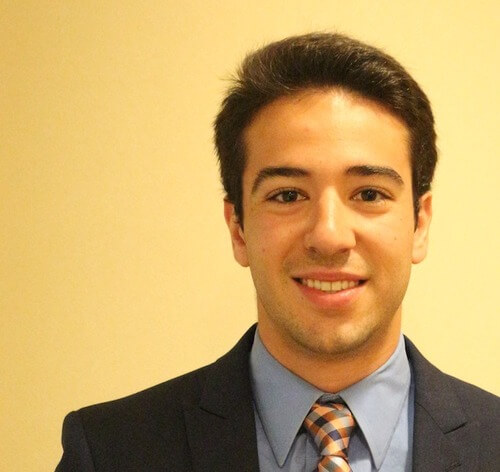
Meet Our Summer Intern – Mike Mazella
30 July 2014 Blog | Tags: interns
This summer, we had the privilege to work with a fantastic college student, Mike Mazzella. As Mike’s summer internship with us wraps up, we asked him a few questions: Could you please tell us a little bit about yourself? I’m a rising Senior at the University of Arizona Honors College, and I’m majoring in Communication with an emphasis on Pre-Law. I’m also a member of two fraternities, and a former Student Body Senator. Pre-Law? So you want to be a lawyer? Yes! I first got interested in law in high school on my debate team. I started following big cases, getting involved with politics, and delivering more public speeches. I found that I had a talent for rhetoric and research. Plus I’ve always wanted to do something that puts me in a position to help other people. What attracted you to Washington Council of Lawyers? I think Washington Council of Lawyers is great because we not only want to help those in need of assistance, but we also want to help people improve their standard of living. The legal community can have a monumental impact on the lives of those in need: everything from helping people find jobs, to keeping a roof over their heads, and making sure they have access to affordable and nutritious foods. It feels good to give back, but it feels even better to have a hand in solving an ongoing problem. What was your favorite part about working for us this summer? All of the amazing people I’ve met this summer. I was lucky enough to be paired with an amazing boss [editors note: Mike is referring to our Executive Director, Nancy Lopez] who thought it was important to introduce me to as many lawyers and public advocates as possible. I’ve really gotten the inside perspective on public-interest law and what it takes to make it. Their advice and encouragement has set me up perfectly for the next four years. What exactly did you do for us this summer? I washed Nancy’s car and walked her dogs…No, I’m just kidding. Mostly I helped to spread the word and set up for events that we hosted. A lot of it was logistics: making name badges, organizing guest lists, setting up the spaces, designing posters, taking notes, and conducting interviews. What is the most important project you’ve worked on this summer? That would have to be the East of the River Blog. For about the past month I’ve sat on a committee designed to create a blog with the goal of inspiring lawyers in DC to do more pro bono work east of the Anacostia River. Our plan is to demonstrate the benefits of doing that kind of work by showcasing some success stories and interviewing the people who made them possible. You’ll see the results of our efforts beginning this fall. Sounds like you’ve been pretty busy. What do you do in your spare time? Here? Sleep! Or I hang out with my friends in the dorm where I’m staying. I’m also taking two classes right now, so that takes up a lot of my time as well. When I’m back home, I perform every week with my improv comedy troupe, and that keeps me going until the weekend. Do you see a future for yourself here in DC? Absolutely, I love this city. I could completely see myself going to school here and then staying to pursue my career. I’ve figured out the subway system, so by now I’m practically a native. Thanks, Mike, and thanks for all of your help this summer! We can’t wait to welcome you back to the DC legal community!

2014 Summer Public Interest Events for Law Students
17 June 2014 Blog | Tags: law students, summer interns
For more information, visit http://www.probono.net/dc/calendar/ _______ Tuesday, June 17 | 1:00 pm – 5:00 pm Caregiver Representation Pro Bono Attorney Training – Children’s Law Center Steptoe & Johnson (1330 Connecticut Avenue, NW; Red Line: Dupont Circle) Register at www.childrenslawcenter.org/pro-bono-home Current and prospective pro bono attorneys are invited to learn about adoption, guardianship, and custody law and practice, and representing caregivers in these cases. A light lunch will be provided. _______ Wednesday, June 18 | 6:30 pm – 8:30 pm Public Interest Happy Hour – Washington Council of Lawyers & Children’s Law Center Children’s Law Center (616 H Street, NW; Red Line: Gallery Place) All are welcome! Invite a friend to join you! _______ Thursday, June 19 | 12:00 pm – 1:30 pm Perspectives on Poverty Law from the Bench: DC Superior Court – Washington Council of Lawyers Jones Day (300 New Jersey Avenue, NW; Red Line: Union Station) Three Superior Court judges will discuss how poverty impacts the justice system, the critical role that pro bono and public interest attorneys play in securing access to justice, and how a public interest career path can lead to a judicial appointment. _______ Tuesday, June 24 | 11:00 am – 1:00 pm Legal Advocacy for People With Intellectual Disabilities – DC Department on Disability Services, Quality Trust for Individuals with Disabilities, and Project Action Arent Fox LLP (1717 K Street, NW; Red Line: Farragut North) RSVP to mwhitlatch@dcqualitytrust.org An interactive brown bag discussion of: practice tips, ethical obligations, reasonable accommodations, advocacy support, and more. _______ Wednesday, June 25 | 12:00 pm – 1:00 pm Lunch and Law: Bullying – Children’s Law Center Conference Call: Dial 605–562–3000 and use passcode 964021# No RSVP is required; learn more at http://www.childrenslawcenter.org/ A discussion of Children’s Law Center’s efforts to address bullying in DC schools. _______ Tuesday, July 8 | 12:00 pm – 1:30 pm Perspectives on Poverty Law from the Bench: DC Court of Appeals – Washington Council of Lawyers DC Court of Appeals (430 E Street, NW – Multipurpose Room; Red Line: Judiciary Square) Three Court of Appeals judges will discuss how poverty impacts the justice system, the critical role that pro bono and public interest attorneys play in securing access to justice, and how a public interest career path can lead to a judicial appointment. _______ Wednesday, July 9 | 6:30 pm – 8:30 pm Fellowships 101: An Introduction to Postgraduate Public Interest Fellowships – Washington Council of Lawyers Georgetown Law (600 New Jersey Avenue, NW – Hart Auditorium; Red Line: Union Station) A panel discussion of the ins and outs of project-based fellowship programs. Expert panelists will offer tips and insights about how to craft the best fellowship proposals while in law school. _______ Thursday, July 10 | 5:00 pm – 8:00 pm An Evening at the United States Holocaust Memorial Museum – Arent Fox LLP Holocaust Memorial Museum (100 Raoul Wallenberg Place, SW; Orange/Blue Line: Smithsonian) For more information, contact Emily.Dorsey@arentfox.com Gerard Leval, General Counsel of the United States Holocaust Memorial Council and a partner at Arent Fox LLP, will discuss legal issues relating to the development of the museum and those affecting the museum’s operations since its opening in 1993. _______ Wednesday, July 16 | 6:30 pm – 8:30 pm Public Interest Happy Hour – Washington Council of Lawyers Thomas Foolery (2029 P Street, NW; Red Line: Dupont Circle) Celebrity guest bartenders pour your drink: Jim Sandman (Legal Services Corporation), Paul Smith (Jenner & Block), Virginia Sloan (The Constitution Project), and William Treanor (Georgetown University Law Center). _______ Friday, July 18 | 12:30 pm – 2:00 pm Practicing Public Interest Law East of the Anacostia River: 4th Annual Summer Panel Discussion with the East of the River Casehandlers Deanwood Library (1350 49th Street, NE; Orange Line: Deanwood) To register, contact Heather Hodges at 202.269.5100 or hhodges@nlsp.org A discussion about student internships and pro bono opportunities east of the river, the DC Bar Foundation’s Loan Repayment Assistance Program for public interest lawyers in DC, and the DC legal services providers that serve the low-income residents of the diverse and vibrant neighborhoods east of the river. _______ Thursday, July 24 | 12:00 pm – 1:30 pm Perspectives on Poverty Law from the Bench: Office of Administrative Hearings – Washington Council of Lawyers Arnold & Porter LLP (555 12th Street, NW; Orange/Blue/Red Line: Metro Center) Three DC Office of Administrative Hearings judges will discuss how poverty impacts the justice system, the critical role that pro bono and public interest attorneys play in securing access to justice, and how a public interest career path can lead to a judicial appointment. _______ Wednesday, July 30 | 12:00 pm – 1:30 pm Perspectives on Poverty Law from the Bench: US District Court for the District of Columbia – Washington Council of Lawyers McDermott Will & Emery (500 North Capitol Street, NW; Red Line: Union Station) Three DC District Court judges will discuss how poverty impacts the justice system, the critical role that pro bono and public interest attorneys play in securing access to justice, and how a public interest career path can lead to a judicial appointment. _______ Monday, August 18 – Friday, August 22 13th Annual Human Rights on the Hill – University of the District of Columbia David A. Clarke School of Law To join the list for more information, including a session schedule, write to JFL@udc.edu The course features presentations from a wide range of human rights lawyers, activists and governmental agency leaders. No credit is offered, no tuition is charged, donations are accepted, and you can go to one or all of the classes.

Law Students Inspired To Do Public Service at Sold-Out Summer Forum
14 June 2014 Blog | Tags: summer pro bono & public interest forum
On June 12, we held our annual Summer Pro Bono & Public Interest Forum. We were joined at Arnold & Porter by over two hundred eager lawyers, summer associates, and legal interns—eager to learn about how to make public service and pro bono work an integral part of their legal careers. Our Executive Director Nancy Lopez got things underway by sharing a line from “For Good”—from the musical Wicked—describing how we can be changed for the better by the people who come into our lives. Nancy drew not only the obvious conclusion—that clients in need can have their lives changed by lawyers who care—but also the converse: that clients can change their lawyers for the better too. Then it was on the keynote speech, delivered by Jim Sandman, President of the Legal Services Corporation. After urging everyone to join Washington Council of Lawyers, Jim shared some words of encouragement and advice for new lawyers. Among other things, lawyers shouldn’t feel the need to devise a master plan: “You shouldn’t have a plan,” Sandman said, because “opportunities for change are around every corner and you should welcome them and follow those that prove promising to bigger and better accomplishments.” He urged young lawyers to get involved in their communities, retain flexibility by living beneath their means—“I drove over here today in my 2003 Honda Civic. With a smile on my face, because I love what I do”—and to work hard on time management. The rousing and humorous speech concluded with Sandman telling the crowd to “find and collect as many mentors as possible. They can even be younger then you, but find people who inspire and motivate you and don’t let them go.” Attendees then broke out into one of five sessions. Each featured panels of experienced lawyers and advocates with experience in a particular field of public-interest or pro bono work. Attendees learned (among many other things) about the diverse career paths of civil-rights lawyers; coping with the intense emotional demands of criminal litigation; the complicated legal and humanitarian issues involved in immigration cases; the unique skills that new lawyers can develop working on pro bono transactional matters, and the desperate need for representation of parties in DC family court. It was a ton of information and inspiration packed into just over two hours. And we can’t wait for next year’s event!

The Exoneration of Sabein Burgess: Pro Bono Lawyers Overcome Junk Science and Help to Free an Innocent Man
09 June 2014 Blog | Tags: pro bono
On May 28, we cosponsored (along with the Constitution Project, the Innocence Project, and Steptoe and Johnson) a panel on the recent exoneration of Sabein Burgess. Burgess spent nearly twenty years in prison for a crime he did not commit. Aleta Spraguehas this report on the panel. At age 24, Sabein Burgess was convicted of murdering his girlfriend at their Baltimore home. His defense attorney called no witnesses during the two-day trial. Burgess was sentenced to life in prison; he remained incarcerated until this year –despite the emergence of contradictory eyewitness testimony and another man’s confession. Eventually, a team of attorneys demonstrated that he was convicted based on faulty forensic evidence. On February 21, 2014, Burgess, now 43, was finally able to return home. The panel featured attorneys from both Steptoe and Johnson and the Mid-Atlantic Innocence Project (MAIP), which worked together on behalf of Burgess. The panelists explained how the justice system failed Burgess by providing an ineffective defense attorney and repeatedly disregarding evidence of his innocence after his conviction – particularly the confession of Charles Dorsey, who today is considered the primary suspect. The conviction of Burgess rested almost entirely on questionable gunshot residue evidence – the validity of which wasformally reassessed by the FBI in 2005. Gunshot residue evidence has a high risk of contamination; today, the FBI has stopped using this type of evidence. Parisa Dehghani-Tafti of the Innocence Project explained how gunshot residue evidence and other forensic science tools were created by law enforcement, are subject to confirmation bias, and generally lack scientific rigor. Indeed, according to MAIP, “flawed forensic science testimony has been a factor in more than half of the DNA exonerations nationwide and in more than 20 percent of all exonerations nationwide.” Unfortunately, the Burgess story is not unique. A 2012 study found that more than 2000 individuals had been convicted and then exonerated of serious crimes since 1989. Mere weeks before Burgess’ release, another study found that exonerations in the U.S. have reached a record high—though an increasing number are linked to false confessions induced by plea bargains, rather than DNA evidence. Most disturbingly, a recent analysis published in the Proceedings of the National Academy of Sciences concluded that nearly one in twenty convictions in capital cases are wrongful – meaning that around 120 of the 3000 individuals on death row are innocent. As one panelist noted, “you have to think twice about the death penalty itself…when a case like this makes its way through the system.” Attorneys who worked on the case urged audience members to find ways to become involved with exoneration work (or with any pro bono cause that speaks to their passions). To learn more about the Mid-Atlantic Innocence Project and identify opportunities to volunteer, click here.
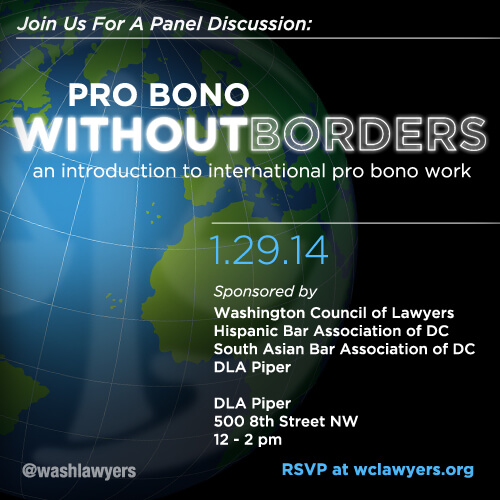
Pro Bono Without Borders: Getting Involved in Global Pro Bono
27 January 2014 Blog | Tags: global pro bono, pro bono
On Wednesday, January 29, we’ll be hosting Pro Bono Without Borders, a panel discussion about global pro bono. To preview the event, Renuka Nagaraj interviewed Jessica Ryckman, Special Counsel & Program Manager at Lawyers Without Borders, about doing pro bono work with an international dimension. Here’s what Jessica had to say: How did LWOB start, and what was the inspiration for it? Christina Storm, the current director, started LWOB about 15 years ago. At the time, she wanted to volunteer for an international program and she could not find any outlets to do this. This inspired her to start a quality program for lawyers and judges who wanted to do pro bono work abroad. What is the mission of LWOB? LWOB focuses on strengthening the rule of law and increasing access to justice around the world and providing pro bono lawyers the opportunity to work on these projects. How did you personally get involved with LWOB? I was working at a law firm and wanted to work on an international pro bono project. I found a project in Liberia that provided training for attorneys and judges on human trafficking laws. After working on this project in Liberia for about 3 weeks, I was hooked and wanted to do this kind of work full-time. I asked Christina Storm if there were any opportunities and fortuitously, LWOB was looking for someone in DC at that time. What do you do at LWOB? I am a Project Manager and Special Counsel and manage some of LWOB’s Africa programs. For example, I have been working, in conjunction with the US Department of State, on a Liberian human trafficking program, which produces in-person trainings and educational materials. I also work on LWOB’s Kenya initiative, which is creating an independent, Kenyan national-led program and also produces annual trainings there. What are the different kinds of projects that LWOB offers? There is a wide range of programs. LWOB does a lot of trainings for judges, lawyers and law enforcement abroad. We also send participants to observe important court proceedings as a neutral party to report on procedure and fairness at the proceedings. For example, LWOB volunteers observed the Caprivi Strip treason trial in Namibia, the longest and largest trial in this country’s history. Furthermore, LWOB creates graphic novels for countries with low literacy rates, on important topics—such as gender rights, human trafficking, inheritance and succession, and HIV/AIDS. Along the same lines, LWOB makes educational coloring books for children, such as one specific to children in Liberia on the dangers of trafficking. Does LWOB work with attorneys of all experience levels? Yes, LWOB takes volunteers of many experience levels. It works with college students, law students, attorneys, and judges. What advice do you have for those who are thinking of doing global volunteering? Just jump right in! If you are interested in pro bono work abroad, contact organizations that do this work and talk to people who have done it before. Don’t be afraid to reach out to people. Sometimes, people think that they can’t make the money or time commitment for a pro bono project. However, it’s not as time-consuming or complicated as you may think. So take the next step and start researching how you can start volunteering. What do volunteers like most about working with LWOB? A lot of people say that volunteering for LWOB was a life-changing event. Volunteers also most frequently comment that the LWOB programs are really well-organized and substantive. They had the chance to really get down to the nitty-gritty when working abroad and to work and build relationships with local lawyers and judges. Are you especially proud of any particular LWOB projects? LWOB has been training on a human trafficking in Liberia since 2007. Liberians have had a human trafficking law in place since 2005, and the first prosecution under the law was not until 2013. This case involved a prosecutor and judge that LWOB trained. After talking to them, they credit the training with helping them understand the law and how to hear and prosecute a trafficking case. That is something I’m so proud of, because it shows the impact you can have in other countries. To learn more, register to attend Pro Bono Without Borders – this Wednesday, January 29.
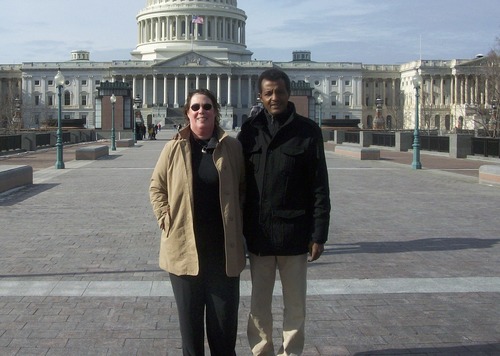
2013 Law Firm Award: Fried Frank
04 December 2013 Blog | Tags: 2013 awards, law firm award
Fried Frank is a major international law firm, recognized for complex financial transactions, securities enforcement work, and high-stakes litigation across the globe. But its lawyers also focus on serving individuals and organizations at home in their communities. Fried Frank’s pro bono practice is broad. Most of Fried Frank’s pro bono clients are low income individuals, but some are legal services organizations and other non-profits, as well as small businesses and start-up entrepreneurs. Matters include ADA litigation, landlord/tenant cases, custody and adoption disputes, asylum and deportation cases, and a wide range of other matters. The firm has also prepared amicus briefs on a variety of issues to the U.S. Supreme Court and other appellate courts. More broadly, Fried Frank is a signatory to the Pro Bono Institute’s Law Firm Pro Bono Challenge. And the firm has established internal policies for advancement and bonus consideration that encourage and reward pro bono service. Earlier this year, more than 32 attorneys in the Washington office were recognized on either the Capital Pro Bono Honor Roll or High Honor Roll for performing 50 or 100 hours of pro bono service in 2012. Fried Frank also received the “40 at 50” award from the Judicial Conference of the DC Circuit because more than 40% of its lawyers performed at least 50 hours of pro bono service during the same year. Fried Frank has worked with a variety of great organizations on pro bono cases, and also has a longstanding relationship with the Washington Council of Lawyers. It has hosted and co-sponsored our events, organized and provided panelists for public-interest career forums and other activities, and has written amicus briefs and published jobs guides on our behalf. Finally, we are greatly for the active participation on our board – over the last two decades – of Fried Frank’s Public Service Counsel, Karen Grisez. Don’t miss tonight’s 2013 Awards Reception – and if you aren’t able to attend, we’ll be live-tweeting it at @WashLawyers! Submit Search the Site
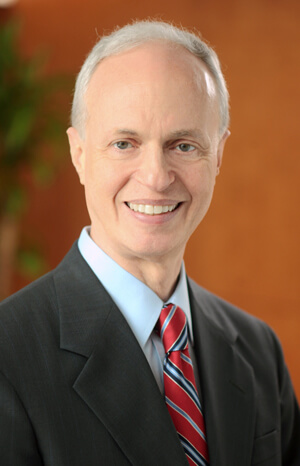
2013 Legacy Award: Larry Schneider (Arnold & Porter)
02 December 2013 Blog | Tags: awards, legacy award
by Aleta Sprague “Don’t sit back. Step up, take a case – just do it.” So advised Larry Schneider, when I asked him for a few words of wisdom for new attorneys seeking to get involved with pro bono practice. And he should know. The winner of our first-ever Legacy Award, Larry has made pro bono work a priority throughout his career, providing both direct services to low-income clients and leading the way in crafting policy reforms to improve the nation’s immigration system. Larry’s commitment to pro bono work emerged in law school, during which he represented clients in both civil and criminal matters through the law school’s clinics and spent a summer working at a legal services organization. Upon graduation, he joined Arnold & Porter, inspired in part by the firm’s established commitment to public service; according to longstanding policy, the firm urged each attorney to devote 15% of his or her time to pro bono matters. Larry joined the firm’s Pro Bono Committee early in his career and also took on a series of leadership positions with the Washington Council of Lawyers, including a term as president in 1983–1984. A pivotal moment in Larry’s pro bono career was the passage of the Immigration Control and Reform Act in 1986, while Larry was serving as Chair of the DC Bar Public Service Activities Committee (now the Pro Bono Committee). Larry recognized that many individuals in DC would newly qualify for citizenship under the Act, but that there was insufficient capacity to accommodate all their legal needs. So Larry began organizing a pro bono effort among area law firms, and got Arnold and Porter to partner with Ayuda and the Washington Lawyers’ Committee. Through this collaboration, volunteer attorneys were able to both serve clients through clinics and identify and address policy issues. Since then, Larry has led Arnold and Porter’s pro bono immigration efforts. One of the most challenging aspects of the work has been coping with deficiencies within the immigration system itself – for example, due to inadequate resources, there are often significant delays in cases being set for hearings. This challenge, however, has also created an opportunity. One of Larry’s most significant projects in recent years involved evaluating the entire U.S. deportation system and providing recommendations for reform. The project, an effort of over fifty Arnold and Porter attorneys, culminated in alengthy report analyzing all aspects of the deportation process and providing sixty policy recommendations for both administrative and legislative action. While Congress has yet to act on the legislative recommendations, a number of administrative changes have been put in place as a result of the report. The policy recommendations themselves, which were endorsed by the ABA, emerged from issues that pro bono attorneys were observing in their cases. The report provided an opportunity to address these issues more systemically. Larry noted that working on pro bono matters as a team helps tremendously in enabling attorneys to balance pro bono work with the rest of their practice – though ultimately, “if you want to do something, you can make time for it.” At Arnold and Porter, for example, two attorneys, along with an associate mentor and a supervising partner, are assigned to each asylum case. This model provides both flexibility and sufficient support to enable new attorneys to feel comfortable getting involved and taking on cases. Larry is an ideal recipient of our inaugural Legacy Award. In addition to his commitment to pro bono work in the DC area, he has been a Washington Council of Lawyers member for over 35 years. Larry served as our president from 1984–85, and has been one of our most trusted advisors, as well as a wonderful mentor to our future leaders. We are pleased to recognize Larry’s exceptional contributions to both pro bono work and the Washington Council of Lawyers. Don’t miss our 2013 Awards Reception to learn more about Larry and this year’s other award winners!






